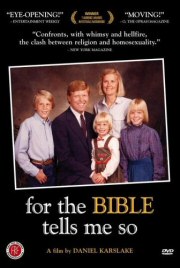 With the temperature dropping, it's time to find someone to keep you warm. Find your hookups with our online dating guide!
With the temperature dropping, it's time to find someone to keep you warm. Find your hookups with our online dating guide!
- Rated NR
- Documentary
- 2007
- Buy DVD
Reviewed by Jeff Giles
()
ven the simplest messages can be corrupted. Take, for instance, the biggest piece of advice that, according to the Bible, Jesus Christ imparted to his followers: “Love one another as I have loved you” – which was itself an outgrowth of previously repeated scriptural exhortations to love thy neighbor as thyself. People being what they are, it isn’t at all surprising that the Bible has been used so often as a weapon – a cudgel for forcing conformity, encouraging exclusion, or worse. But it’s no less bitter a pill to swallow, especially during an era in which Christianity’s public face is increasingly strident. The Enlightenment was hundreds of years ago – you’d think that, by now, we’d have found a way to comfortably bridge the gap between faith and science, or that religion in general might have evolved into a more perfect vehicle for the expression of love. Sadly, neither of these things has come to pass.
Hence Daniel Karslake’s “For the Bible Tells Me So,” a beautifully persuasive counterpoint to the oft-heard argument that Biblical scripture condemns homosexuality (or, to put it in the language more commonly seen on signs held up by followers of the loathsome Rev. Fred Phelps, “GOD HATES FAGS”). Given the current climate, it’s sadly tempting to believe that Karslake’s documentary is more likely to provoke (or preach to the choir) than truly enlighten, but that doesn’t make the film any less powerful.
Karslake makes his argument by interviewing a wide array of public personalities, religious figures, and Biblical scholars, including Archbishop Desmond Tutu, Rabbi Brian Zachary Mayer, Rev. Dr. Laurence C. Keene, and the family of former House Majority Leader Dick Gephardt. As a number of the interviewees are only too happy to point out, there isn’t really any new ground being broken here; many decades of scholarly study have revealed untold levels of historical context surrounding the contents of the Old and New Testaments, and Biblical literalism – a 20th-century fad, by the way – is a pitfall-laden path. (As one of Karslake’s guests puts it, “There’s nothing wrong with a fifth-grade understanding of scripture. As long as you’re in fifth grade.”) Getting into the nuts and bolts of the film’s argument against using scripture to bolster an anti-gay bias would spoil the fun of watching the movie. Suffice it to say that any open-minded person will have to struggle mightily to come away from the viewing experience without at least taking a moment to question his or her beliefs.
Between bouts of contextualizing scripture, the film follows the stories of several parents’ struggles to reconcile their religious beliefs with the homosexual lifestyles of their children. It’s a testament to Karslake’s directorial gifts – and his subjects’ incredible, unflinching honesty –that these stories aren’t all sunshine and roses. The families’ tales range from the tragic to the inspirational, but all of the participants seem to have been willing to open themselves to the cameras completely in order to help others understand that religion and homosexuality aren’t mutually exclusive.
To that end, the film’s most inspirational tale is the story of Gene Robinson, the openly gay Episcopal Bishop whose consecration made history – and set off such a firestorm of controversy that he had to wear a bulletproof vest under his vestments during the ceremony. Watching the unbridled joy of Robinson’s congregation as they confirmed him, and the myriad of emotions behind his eyes as he surveys the crowd and tries to come to grips with becoming a symbol of unbelievable inspiration and unspeakable contempt, is worth the price of the film alone.
Passages from the Bible have been used to justify all sorts of asinine things, from slavery to segregation to keeping women from voting. Perhaps one day, the people who seem so eager to use the words they claim to have taken from God as dividing lines will run out of divisions to make – or, better yet, truly come to grips with the concept of unconditional love. Until then, movies like “For the Bible Tells Me So” are essential viewing for the human race.
You can follow us on Twitter and Facebook for content updates. Also, sign up for our email list for weekly updates and check us out on Google+ as well.











